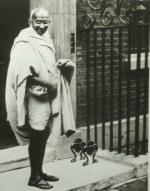|
This section contains 266 words (approx. 1 page at 300 words per page) |
Mohandas Karamchand Gandhi
He was given the title "Mahatma" or the "Great Soul" by the Indians. He is also known as the "Father of the Nation" or "Bapu" for his great contribution in the country's struggle for independence. From the time he took charge of the freedom struggle and the Indian National Congress in 1918, he became a national icon that inspired millions.
Some of his campaigns are: boycotting foreign (mostly British) products, non-violent civil disobedience (not paying taxes, burning registration cards) brought forth Indian nationalism. Gandhi's campaigns/movements such as the "Non-Cooperation Movement", "The Swadeshi Policy", "The Salt Satyagraha" and "Quit India Movement" united the Indians, Muslims and Hindus alike.
Ironically, though Gandhi's principle of non-violence attracted many faithful followers such as Jawaharlal Nehru, it also brought Gandhi many enemies. The British Government, African leaders and even some of his fellow Indians were his enemies. One Hindu extremist, Nathuram Godse, ended his life in New Delhi on January 30, 1948.
Mohandas Gandhi's legacy still lives on, however, in the hearts of the Indian people. His birthday on October 2, Gandhi Jayanti, is a national holiday in India. Gandhi's life has even inspired others to pursue independence, people such as Martin Luther King, Jr., the Dalai Lama, Stephen Biko, Aung San Suu Kyi and Nelson Mandela.
|
This section contains 266 words (approx. 1 page at 300 words per page) |


